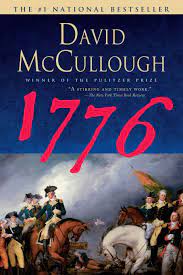I bought this book more than a year ago. A friend who teaches literature said he has read this book every couple of years for more than a decade. He has read several books by David McCullough and 1776 is his favorite.
I just finished a biography of Thomas Jefferson and decided now was the time to read about the most fateful year in American history. The book is even better than my friend Ray led me to believe. The story is riveting from end to end, and the end is the best. The drama of the battles for Trenton and Princeton kept me reading intently right to the final paragraph.
The events of the year provide an arc that would make a good movie script. The first battle of 1776 is the highest moment for America. The long seige of Boston ends when Washington puts a battery of cannon atop Dorchester Heights in one night without the British knowing what was happening. In the evening the Heights are empty, in the morning nearly two dozen guns are emplaced behind revetments dragged up the hill by two thousand men.
Within days the British are on the way to Halifax in defeat.
The triumph is followed by a long string of defeats in late summer in New York ending with the loss of Fort Washington with nearly 3,000 Americans captured. Several times in those campaigns, the British stopped just short of wiping out the American Army. As the year ended the bedraggled Americans were at a small fraction of the strength they started the year with. Lord Howe, the British commander decided to end the campaign and finish Washington off in the spring.
The year almost ends with the Americans in total defeat. Then the night after Christmas, Washington personally led an attack in a blizzard across the Delaware River. The Americans defeated the 1,500 Hessians in Trenton, killing or capturing a thousand with five hundred fleeing.
Along with the great drama of the story, is real insight into the character of the leaders, particularly George Washington. The man who would become the first American President did not do everything right, be he carried himself with dignity in every situation. He was tireless and showed confidence in the worst situations. And at the very worst times, as in the attack on Trenton, Washington was at the front of the attack and the perilous river crossing.
The heroes of the story were young men. Washington was the old man of the Army at 44 years old. Thomas Jefferson was 33 when the Declaration of Independence he wrote was read across the new nation. Nathaniel Greene, one of Washington's best field commanders was also 33. Colonel Henry Knox, the hero of the victory in Boston, was 25 when the British fled his guns. One of his battery captains was Alexander Hamilton who was either 19 or 21 depending on when he was actually born, there is some doubt. James Madison was 25 in 1776. John Adams who kept the Continental Congress focused on supporting the war had just turned 40.
The founders of America were young men of great physical courage who fought for an ideal that has become a beacon of democracy to the world.
In two years, I will re-read this book along with my friend Ray.
First eight books of 2022:
The Life of the Mind by Hannah Arendt
Civilization: The West and the Rest by Niall Ferguson
How to Fight Anti-Semitism by Bari Weiss
Unflattening by Nick Sousanis
Marie Curie by Agnieszka Biskup (en francais)
The Next Civil War by Stephen Marche
Fritz Haber, Volume 1 by David Vandermeulen

















